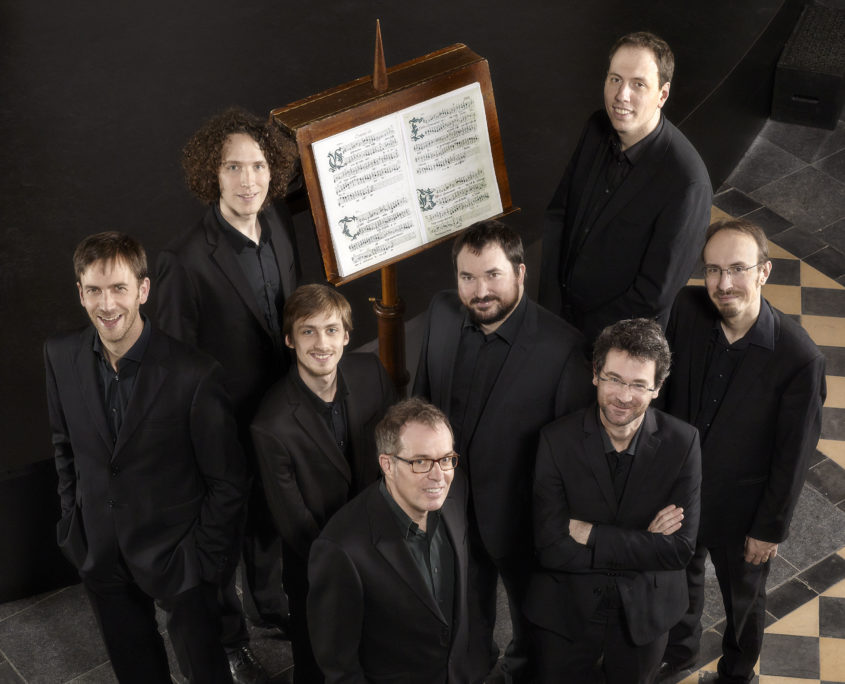Cappella Pratensis serves up a clever twist on Josquin for UC Presents

This season’s Howard Mayer Brown International Early Music Series from the University of Chicago Presents has begun. Kicking it off Sunday afternoon at the Logan Center was a concert by the seven-man Dutch vocal ensemble Cappella Pratensis.
Their program centered on the ensemble’s namesake: Josquin des Prez, the most acclaimed composer in all of Renaissance Europe. The program had a clever twist. The first half was dedicated to Josquin works that adapted his predecessors, and the second half was dedicated to his successors re-setting texts most famously set by him. Hence, the title of the concert: “Imitation Game”—Josquin first as imitator, then as imitated.
Imitation has another meaning in music: contrapuntal imitation—overlapping iterations of the same melodic figure, as you would find in a fugue or canon. Josquin’s music is replete with these—more so than even in Bach’s music.
A crucial performance question, then, is how much you want to draw attention to these patterns of imitation. In Bach’s music, the standard practice is to dial back the dynamics of all of the non-imitative voices, so every overlapping entrance cuts through the texture.
This was not Cappella Pratensis’s main strategy. Their singing was impeccably clean, in timbre and balance alike. But their emphasis was on the shape and flow of lines, more than on how the lines were put together. In repertoire so often thought to be all about the intellectual beauty of counterpoint, they drew out the more vital beauty of melody.
An exception to this was their rendition of Josquin’s playful reworking of his teacher Ockeghem’s setting of the chanson “Petite camusette.” Here the imitated phrases are short little mottos. The singers pealed the beginning of each motto like a bell–a ping on the attack and a rapid decay. The contrapuntal interplay was thus especially clear. But they also added a subtle lilt to their rhythms, so the music almost swung.
Cappella Pratensis’s signature trait is using facsimiles of original choirbooks in lieu of modern sheet music. This means huddling around one music stand in the center. Whether this actually affects the quality of their music-making, or is just a form of unique branding, is anyone’s guess.
Of course, this approach works only for pieces that appear in choirbook format—i.e. sacred music. For all of the secular songs on the program, each singer read from an individual songbook. This gave them room to spread out on the stage, and they took advantage of this by singing different songs in different formations.
An effective use of this came early in the concert. Josquin’s motet Victimae paschali laudes quotes two earlier chansons: Ockeghem’s “D’ung aultre amer” and Hayne van Ghizeghem’s “De tous biens plaine.” Before performing the motet, Cappella Pratensis sang both of these chansons.
To illustrate Josquin’s art of combination, they put one group of three singers on the left and another group of three on the right. The one on the left sang the Ockeghem, then the one on the right sang the Ghizeghem, and then they regrouped and sang the Josquin in the center. Even if you couldn’t pick out these melodies while listening to the motet, the visual representation made their synthesis clear.
Playing around with staging was a smart move, generally. If you are a great lover of music c.1450–1550, the differences between the various styles and genres on the program might register with you. But if that’s not a century you spend a lot of time in, the songs might bleed together. Granting each a distinct visual profile helped avoid that.
The audience called Cappella Pratensis back for an encore, and they obliged by repeating “Petite camusette.” It’s not often these days that encores are literal encores of pieces from the program. Consider this in keeping with Cappella Pratensis’s tradition of bringing back the best of older performance practices.
Clarinetist Alexander Fiterstein performs Weinberg’s Clarinet Sonata and
Messiaen’s Quatuor pour la fin de temps with violinist Elena Urioste, cellist Nicholas Canellakis, and pianist Michael Brown 7:30 p.m. Friday at Mandel Hall. chicagopresents.uchicago.edu; 773-702-2787.
Posted in Uncategorized

